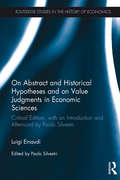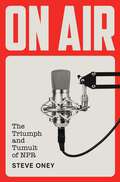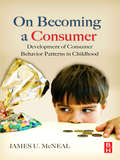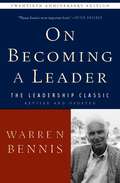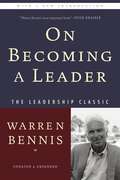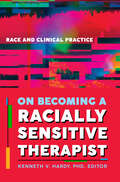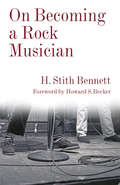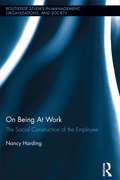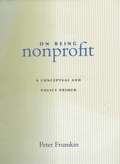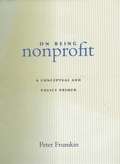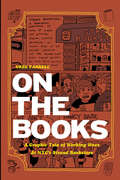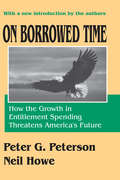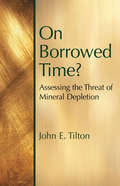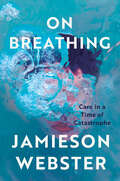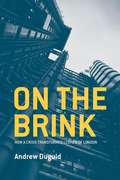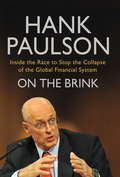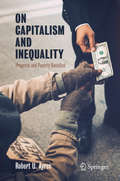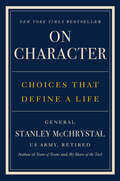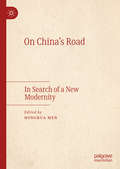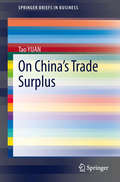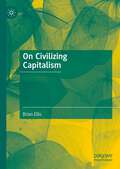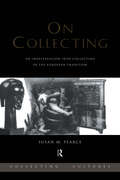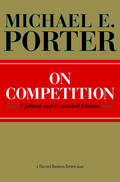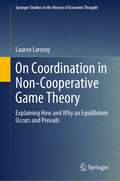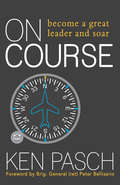- Table View
- List View
On Abstract and Historical Hypotheses and on Value Judgments in Economic Sciences: Critical Edition, with an Introduction and Afterword by Paolo Silvestri (Routledge Studies in the History of Economics)
by Luigi EinaudiLuigi Einaudi (1874-1961) was a leading liberal economist, economic historian and political figure. This book provides the English-speaking world with a first critical edition of Einaudi’s – hitherto unpublished – rewriting of one of his most unique and thoughtful essays. The relevance of this essay is crucial from several perspectives: history and methodology of economic thought, role of economics and its relation to other disciplines and to social values, role of economists in the public sphere, while also encompassing the discourse on man and the economist as a "whole man". The critical edition of On Abstract and Historical Hypotheses and on Value Judgments in Economic Sciences includes a comprehensive introduction and afterword. An extensive reappraisal of this newly discovered essay will help to cast light on Einaudi’s uniqueness and originality within and beyond the Italian tradition in public finance, thereby also illuminating his attempt to provide an epistemological account of his long lasting enquiry into the causes of good and bad polities. This book is of great interest to those who study economic theory and philosophy, as well as history of economic thought, public economics and legal and political philosophy.
On Air: The Triumph and Tumult of NPR
by Steve OneyAn epic, decade-long reported history of National Public Radio that reveals the unlikely story of one of America&’s most celebrated but least understood media empires.Founded in 1970, NPR is America&’s most powerful broadcast news network. Despite being overshadowed by the larger and more glamorous PBS, public radio has long been home to shows such as All Things Considered, Morning Edition, and This American Life that captivate millions of listeners in homes, cars, and workplaces across the nation. NPR and its hosts are a cultural force and a trusted voice, and they have created a mode of journalism and storytelling that helps Americans understand the world in which we live. In On Air, a book fourteen years in the making, journalist Steve Oney tells the dramatic history of this institution, tracing the comings and goings of legendary on-air talents (Bob Edwards, Susan Stamberg, Ira Glass, Cokie Roberts, and many others) and the rise and fall and occasional rise again of brilliant and sometimes venal executives. It depicts how NPR created a medium for extraordinary journalism—in which reporters and producers use microphones as paintbrushes and the voices of people around the world as the soundtrack of stories both global and local. Featuring details on the controversial firing of Juan Williams, the sloppy dismissal of Bob Edwards, and a $230 million bequest by Joan B. Kroc, widow of the founder of McDonalds, On Air also chronicles NPR&’s daring shift into the digital world and its early embrace of podcasting formats, establishing the network as a formidable media empire. Fascinating, revelatory, and irresistibly dishy, this is a riveting account of NPR&’s unlikely launch, chaotic ascent, and ultimate triumph—a must-read for anyone interested in the history of public radio and its impact on American culture.
On Becoming a Consumer
by James McNealThe book demonstrates how consumer development is intertwined with cognitive and motor development; each of the three dependent on the other two. Showing consumer behavior being responsible for body and mind development is new thinking; yet, the examples are clearly presented so that any interested person can grasp them. Presenting consumer behavior in stages of development, while logical, is essentially new also. We are familiar with cognitive development, for example, being described in stages, but not CB. In fact, stages of cognitive development are sometimes used as a framework for explaining consumer behavior but not its development as such. In this sense then, the book might be considered cutting edge as compared to one that offers a slightly different approach to the existing thought on consumer behavior.
On Becoming a Leader: A Workbook On Becoming A Leader
by Warren BennisDeemed "the dean of leadership gurus" by Forbes magazine, Warren Bennis has for years persuasively argued that leaders are not born-they are made. Delving into the qualities that define leadership, the people who exemplify it, and the strategies that anyone can apply to achieve it, his classic work On Becoming a Leader has served as a source of essential insight for countless readers. In a world increasingly defined by turbulence and uncertainty, the call to leadership is more urgent than ever.Featuring a provocative new introduction, this new edition will inspire a fresh generation of potential leaders to excellence.
On Becoming a Leader
by Warren BennisDeemed "the dean of leadership gurus" by 'Forbes' magazine, Warren Bennis has for years persuasively argued that leaders are not born--they are made. Delving into the qualities that define leadership, the people who exemplify it, and the strategies that anyone can apply to achieve it, his classic work 'On Becoming a Leader' has served as a source of essential insight for countless readers. In a world increasingly defined by turbulence and uncertainty, the call to leadership is more urgent than ever. Featuring a provocative new introduction, this new edition will inspire a fresh generation of potential leaders to excellence.
On Becoming a Racially Sensitive Therapist: Race and Clinical Practice
by Kenneth V. HardyTransform your clinical practice by transforming yourself Claims of color blindness and the insistence that all clients are essentially the same have contributed to a dearth of knowledge and understanding regarding the delivery of racially sensitive treatment. For many clinicians, addressing issues of race in therapy mirrors the same discomfort that permeates most of our efforts to discuss it outside of treatment. Yet providing racially sensitive therapy, as well as possessing the clinical acumen to address complex issues of race and culture, is vital to competent contemporary practice. The volume is organized into three fundamental sections with contributions from mental health experts who have done the work to unlearn systemic biases about race and therapy. The first section introduces the concept of a racially sensitive therapist and what it means to become one. The second section focuses on cultural and racial storytelling to help uncover unknown parts of oneself and emphasizes racial self-examination, self-interrogation, and personal transformation. And the final section transports the reader from seeing and being to doing with racially informed intervention methods. A monumental undertaking, this book is an essential step for healers and caregivers to reframe the therapy process for all clients. Contributors include: Lane Arye, Vanessa Bing, Toby Bobes, Bonnie Cushing, Elana Katz, Niketa Kumar, Sharon RC Lee, Gloria Lopez-Henriquez, Yasmeen Rubidge, and Virginia Seewaldt.
On Becoming a Rock Musician (Legacy Editions)
by H. Stith BennettIn the 1960s and 1970s, becoming a rock musician was fundamentally different than playing other kinds of music. It was a learned rather than a taught skill. In On Becoming a Rock Musician, sociologist H. Stith Bennett observes what makes someone a rock musician and what persuades others to take him seriously in this role. The book explores how bands form; the backstage and onstage reality of playing in a band; how bands promote themselves and interact with audiences and music professionals like DJs; and the role of performance.
On Being At Work: The Social Construction of the Employee (Routledge Studies in Management, Organizations and Society #21)
by Nancy HardingInspired by the work of the philosopher Judith Butler, influenced by Marx’s theory of alienation and intrigued by theories of death, this book develops an anti-methodological approach to studying working lives. Distinctions are drawn between labour (the tasks we do in our jobs) and work (self-making activities that are carried out at the workplace): between the less than human, zombie-like laborer and the working human self. Nancy Harding argues that the experience of being at work is one in which the insistence on practising one’s humanity always provides a counter-point to organisational demands.
On Being Nonprofit: A Conceptual And Policy Primer
by Peter FrumkinThis concise and illuminating book provides a road map to the evolving conceptual and policy terrain of the nonprofit sector. Drawing on prominent economic, political, and sociological explanations of nonprofit activity, Peter Frumkin focuses on four important functions that have come to define nonprofit organizations. The author clarifies the debate over the underlying rationale for the nonprofit and voluntary sector's privileged position in America by examining how nonprofits deliver needed services, promote civic engagement, express values and faith, and channel entrepreneurial impulses. He also exposes the difficult policy questions that have emerged as the boundaries between the nonprofit, business, and government sectors have blurred. Focusing on nonprofits' growing dependence on public funding, tendency toward political polarization, often idiosyncratic missions, and increasing commercialism, Peter Frumkin argues that the long-term challenges facing nonprofit organizations will only be solved when they achieve greater balance among their four central functions. By probing foundational thinking as well as emergent ideas, the book is an essential guide for nonprofit novitiates and experts alike who want to understand the issues propelling public debate about the future of their sector. By virtue of its breadth and insight, Frumkin's book will be an invaluable resource for anyone interested in understanding the complex interplay of public purposes and private values that animate nonprofit organizations.
On Being Nonprofit: A Conceptual and Policy Primer
by Peter FrumkinThis concise and illuminating book provides a road map to the evolving conceptual and policy terrain of the nonprofit sector. Drawing on prominent economic, political, and sociological explanations of nonprofit activity, Peter Frumkin focuses on four important functions that have come to define nonprofit organizations. The author clarifies the debate over the underlying rationale for the nonprofit and voluntary sector's privileged position in America by examining how nonprofits deliver needed services, promote civic engagement, express values and faith, and channel entrepreneurial impulses. He also exposes the difficult policy questions that have emerged as the boundaries between the nonprofit, business, and government sectors have blurred. Focusing on nonprofits' growing dependence on public funding, tendency toward political polarization, often idiosyncratic missions, and increasing commercialism, Peter Frumkin argues that the long-term challenges facing nonprofit organizations will only be solved when they achieve greater balance among their four central functions. By probing foundational thinking as well as emergent ideas, the book is an essential guide for nonprofit novitiates and experts alike who want to understand the issues propelling public debate about the future of their sector. By virtue of its breadth and insight, Frumkin's book will be an invaluable resource for anyone interested in understanding the complex interplay of public purposes and private values that animate nonprofit organizations.
On The Books: A Graphic Tale of Working Woes at NYC's Strand Bookstore (Comix Journalism Ser.)
by Greg FarrellA David and Goliath story, On The Books is the first-hand comic strip account of the labor struggle at NYC's legendary Strand bookstore in the summer of 2012. Told by Greg Farrell-an employee of the store who interviewed numerous other members of the staff-the book examines the motives and actions of those involved, including the store, the staff, the union local, and the people of New York City. Through interstitial comic portraits Farrell gives voice to his comrades, who often share a nuance of the story that would have otherwise gone overlooked and provide a depth of opinion and fairness to accompany Farrell's often very personal interpretation of events. In ten short chapters the book explores at once the inner workings of our national retail environment, the struggle to exist within it as a young working person, the current state of the book trade, and the impact of the economic recession on all of these factors.
On Borrowed Time: How the Growth in Entitlement Spending Threatens America's Future
by Neil HoweEntitlements represent one of the largest and fastest-growing portions of the federal budget. They are regarded as sacrosanct by lawmakers, yet many people see them as one of the greatest threats to the American Dream. This volume argues that by sacrificing the future in order to pay ever-larger federal benefits through programs such as Social Security, Medicare, and federal pensions, entitlement spending has become a crushing burden to American workers. Peterson and Howe destroy myths surrounding entitlement spending. They show that the bulk of it does not go to the poor. The majority of the elderly are not needy and dependent. Entitlement programs, not defense spending, consume the largest share of the federal budget. In short, we cannot balance the budget without reducing entitlement spending. In a country that demands critical investments--improving public education, alleviating poverty, increasing professional opportunity--growth in entitlement spending is unaffordable.On Borrowed Time is an important and timely book that will be mandatory reading for policymakers, politicians, economists, and a general public concerned with its financial future.
On Borrowed Time: Assessing the Threat of Mineral Depletion
by John E. TiltonThe sharp rise in mineral use has revived concern about scarcity. Economist John Tilton responds by analyzing recent trends in the consumption and availability of minerals that are most integral to the needs of modern civilization. He reminds readers that, if the arguments about scarcity sound familiar, it is because the story of minerals scarcity is almost as old as human history-and so too is substitution and technological innovation. The issue at hand is the unprecedented acceleration in exploitation and use. Given global population growth, rising living standards, and environmental concerns, how seriously should today?s society take the threat of mineral exhaustion? On Borrowed Time? provides general interest and student readers with an accessible framework for understanding scarcity. Tilton defines important concepts and explores the methods used to study mineral scarcity, including physical measures of known reserves and the total resource base, and economic measures, such as extraction and end-user costs. He notes the increasing emphasis on the social and environmental costs of mineral production and use, placing the scarcity debate in context of broader concerns about sustainability and equity. He adds a history of thought about scarcity, from Malthus and Ricardo to Harold Hotelling, Donella Meadows, to the present day.
On Breathing: Care in a Time of Catastrophe
by Jamieson WebsterA gorgeous, expansive piece of narrative non-fiction about care, dependence, and what it means to breathe in an age of environmental catastropheA few moments after birth we begin to use our lungs for the first time. From then on, we must continue breathing for as long as we are alive. And although this mostly happens unconsciously, in a society plagued by anxiety, climate change, environmental racism, and illness, there are more and more instances that &“teach us about the privilege that is breathing.&” Why do we so easily forget the air that we breathe in common? What does it mean to breathe when the environment that sustains life now threatens it? And how can life continue to flourish under conditions that are increasingly toxic? To approach these questions, Jamieson Webster draws on psychoanalytic theory and reflects on her own experiences as an asthmatic teenager, a deep-sea diver, a palliative psychologist during COVID, a psychoanalyst attentive to the somatic, and a new mother. The result is a compassionate and timely exploration of air and breathing as a way to undo the pervasive myth of the individual by considering our dependence on invisible systems, on one another, and the way we have violently neglected this important aspect of life.
On The Brink
by Andrew DuguidThis is the story of how huge losses very nearly destroyed a revered British institution, Lloyd's of London, the world's largest insurance market; how outraged members challenged a complacent institution; and how it changed to confront and overcome its biggest ever crisis. Ten thousand people faced huge personal bills they thought profoundly unfair. They were trapped; there was no escape. The market that insured disasters had become a disaster for its members. The story of Lloyd's is relevant now, raising many contemporary issues: levels of professional competence, trust, negligence, perverse incentives, and responsibilities owed by insiders to outside investors. High rewards contrast sharply with disastrous results. It raises the legitimacy of governing institutions, the right degree and form of self-regulation and the role of government. It illuminates the limits of tolerance, the power of anger, and its limitations. The search for justice shines a light on the workings of the English and US legal systems. Fairness is pitted against commercial expediency. Old attitudes clash with new circumstances. Leadership is critical in building trust and deciding when to compromise. Fresh thinking, new structures and new skills are all needed to find a way to balance the interests of past and future stakeholders. Persuasion has to overcome alternative analysis, misunderstanding, anger and inertia. Engagement of opposing parties proves critical. The issues illustrated by this story arise each day in Britain, the US and elsewhere. On the Brink is a true story of strong characters, changing fortunes, contrasting values, incompetence, real experts, self-help, creative compromise, innovation and change. It is the story of individuals, groups, leaders and the institution, locked in a battle for survival, each slow to see their common interest. To this day, the Lloyd's crisis raises strong emotions among those involved; many myths have grown up. This book tells what really happened, from the inside. A website, www. onthebrink. uk. com, accompanies this book with extra detail for those interested.
On The Brink
by Hank PaulsonFast-paced and dramatic re-telling of the financial crisis that nearly bought the developed world to its knees. Hank Paulson was at the absolute epicentre of the recent economic storm, and his account of how he dealt with the greatest financial crisis since the Great Depression makes for absolutely fascinating reading. The book contains all the decisive moments in the economic crisis, including the pivotal meetings with mortgage giants Fannie Mae and Freddie Mac, as well as Paulson's personal recollections of and conversations with President Bush, President Obama, Federal Reserve Chairman Ben Bernanke and current Treasury Secretary Timothy Geithner. As well as detailing the major decisions taken during the crisis, Paulson also puts forth the policies he believes need to be implemented to take us securely into the future.
On Capitalism and Inequality: Progress and Poverty Revisited (Springer Praxis Bks.)
by Robert U. AyresCapitalism is under attack. Defenders say that capitalism has raised billions of people from poverty. But a central activity of capitalism today, Wall Street style, is speculation (gambling), using other people’s money, and privatizing the profits while socializing the debts. Skeptics argue that capitalism has redistributed the wealth of the planet in favor of a very few, meanwhile leaving the planet in bad shape and leaving billions of people out in the cold. Wealth is now extremely mal-distributed, opportunity is far from equal, and upward social mobility has declined significantly in recent decades. This book reviews the evidence and arguments pro and con in considerable detail.The evidence is mixed. The main virtue of capitalism is its emphasis on competition as a driver of innovation and, thus, of economic growth. It is true that economic growth has accelerated in recent centuries, and it is true that billions of people have been lifted from poverty. But it is not necessarily true that intense “winner take all” competition in the marketplace is the explanation for growth. Neoclassical economic theory posits that self-interest is the primary motive for all economic decisions, leaving little room for cooperation and even less for altruism. The theory applies to an unrealistic “model” of human behavior, known as Homo economicus or “economic man”, whose characteristic activity is buying or selling.The reason for using the adjective word “social” – as in socialism” or “social service” or “social democracy” -- is, essentially, to deny those postulates of standard economic theory. Real humans are not rational utility maximizers (whatever that is) and very often do things that are not in their own personal best interests. This can happen because other interests, such as family loyalty, professional, religious, or patriotic duty, may take precedence. Real people rarely behave like Homo economicus, who has rivals but no friends. He (or she) does not trust anyone, hence cannot cooperate with others, and can never create, or live in, a viable social system (or marriage). Yet social systems, ranging from families and tribes to firms, cities, and nations do (and must) exist or civilization cannot exist. A viable social system must not allow “winner takes all”. It must reallocate some of the societal wealth being created by competitive activities to support the young, the old and the weak, because all of those people have equal rights, if not the same luck or the same skills.Both competition and cooperation have important roles to play. A hybrid capitalism involving both is the only viable solution. The book ends with a specific suggestion, namely Universal Basic Income, or UBI.
On Character: Choices That Define a Life
by General Stanley McChrystalFrom the bestselling author of Team of Teams and My Share of the Task, reflections on character, and who we choose to be. &“Reputation is what men and women think of us; character is what God and angels know of us.&” —Thomas PaineHow to measure a life? After a career of service, retired four-star general Stanley McChrystal had much to contemplate. He pondered his successes and failures, his beliefs and aspirations, and asked himself, Who am I, really? And more importantly, who have I become? When I die, how will I be measured?In the end, McChrystal came to a conclusion as simple as it was profound: the reality of who we are cannot be recorded in dates or accomplishments. It is found in our character—the most accurate, and last full measure, of who we choose to be.On Character offers McChrystal&’s blueprint for living with purpose and integrity, challenging us to examine not just our deeds but who we become through them. Drawing from a lifetime of experience, he distills profound insights on setting and meeting standards, aligning actions with beliefs, and offers practical advice on overcoming obstacles and pursuing self-improvement.According to McChrystal, character is not a trait inherited at birth, nor does it automatically come from education, position, or experience. Character, instead, comes down to a succession of choices, most mundane, several momentous, that reveal the deep truth of our capacity for virtue.In an era where understanding and upholding our ideals is more crucial than ever, On Character offers an inspiring roadmap for personal growth and integrity—a call to become our best selves, both as individuals and as Americans.
On China's Road: In Search of a New Modernity
by Honghua MenThis book aims to delve deeper into China’s Road studies, bringing together China’s leading scholars from different disciplines to examine, with reference to the grand strategies of major powers in the world, the strategically important issues that China faces, the interactions between domestic politics and international politics, and the way in which China seeks to become a world player. The book contains articles analyzing the history and reality of China’s road, domestic and international foundations of China’s Road, and China’s Road and the world’s future. The authors also discuss the unique aspects of China’s Road, as the properties and the selection of the system, ideas, and development model all comprise an unalterable socialist direction, government-led market economic system, human-oriented core ideas, and gradual reform. With balanced and peaceful development, cooperation, and mutual benefits as outstanding characteristics, China’s Road will ensure that China continues to progress.
On China's Trade Surplus
by Tao YuanChina's trade surplus is an essential question, but there are many popular misconceptions about it, a fact that prompted the creation of this book, On China's Trade Surplus. It will help readers to understand the manner in which China's foreign trade and China's role in global trade have developed, and to how to benefit from trade with China. In this book, many hot topics are analyzed, such as: What promotes China's trade surplus? Why doesn't it have a trade deficit? What are the relations between trade frictions and China's trade surplus, and how can trade frictions be reduced? What is the deeper meaning of the U.S. trade deficit with China?
On Civilizing Capitalism
by Brian EllisThis book shows how modern political, economic and moral theory, including our ideas of liberty and individualism, are trapped in 17th century notions of intuitive reasoning and not informed by modern scientific understanding. Brian Ellis starts with a re-appraisal of the founding of the United Nations and the political and economic policies of the post-war reconstruction period. He then shows how this period, despite its many faults, embodied a philosophy more closely embedded in scientific realism than dominant theories of either left or right today. He goes on to develop this philosophy, meticulously, demolishing theories of Rawls, Nozick and others along the way. The result is a philosophy that investigates how a society actually works, supports evidence-based economics and can better enable human beings to flourish. It is a philosophy that can also accommodate the historical differences between societies and their different, but parallel, development strategies over time.
On Collecting: An Investigation into Collecting in the European Tradition
by Susan PearceOn Collecting examines the nature of collecting both in Europe and among people living within the European tradition elsewhere.Susan Pearce looks at the way we collect and what this tells us about ourselves and our society. She also explores the psychology of collecting: why do we bestow value on certain objects and how does this add meaning to our lives? Do men and women collect differently? How do we use objects to construct our identity?This book breaks new ground in its analysis of our relationship to the material world.
On Competition
by Michael E. PorterFor the past two decades, Michael Porter's work has towered over the field of competitive strategy. On Competition, Updated and Expanded Edition brings together more than a dozen of Porter's landmark articles from the Harvard Business Review. Five are new to this edition, including the 2008 update to his classic "The Five Competitive Forces That Shape Strategy," as well as new work on health care, philanthropy, corporate social responsibility, and CEO leadership. This collection captures Porter's unique ability to bridge theory and practice. Each of the articles has not only shaped thinking, but also redefined the work of practitioners in its respective field. In an insightful new introduction, Porter relates each article to the whole of his thinking about competition and value creation, and traces how that thinking has deepened over time.This collection is organized by topic, allowing the reader easy access to the wide range of Porter's work. Parts I and II present the frameworks for which Porter is best known--frameworks that address how companies, as well as nations and regions, gain and sustain competitive advantage. Part III shows how strategic thinking can address society's most pressing challenges, from environmental sustainability to improving health-care delivery. Part IV explores how both nonprofits and corporations can create value for society more effectively by applying strategy principles to philanthropy. Part V explores the link between strategy and leadership.
On Coordination in Non-Cooperative Game Theory: Explaining How and Why an Equilibrium Occurs and Prevails (Springer Studies in the History of Economic Thought)
by Lauren LarrouyBy offering a critical assessment of the evolution of standard game theory, this book argues for a shift in the ontology and methodology of game theory for appraising games, one based on understanding the players’ strategic reasoning process. Analyzing the history of economic thought, the book highlights the methodological issues faced by standard game theory in its treatment of strategic reasoning and the consequence it has on the status of players’ beliefs. It also highlights how the two original contributions of T. C. Schelling and M. Bacharach can be applied to these issues. Furthermore, the book assesses the intersubjective dimension in games by applying the cognitive sciences and by integrating simulation theory into game theory. Consequently, this book offers an interdisciplinary approach for reassessing the nature of the intersubjectivity involved in strategic reasoning. It shows that the analysis of games should involve the study and identification of the reasoning process that leads the players to a specific outcome, i.e., to a specific solution. A game should not be understood (as is done in standard game theory) as a mathematical representation of an individual choice at equilibrium. This requires investigating the players’ capacity for coordination. Understanding the process of coordination allows us to understand strategic reasoning and ultimately to provide new answers to the indeterminacy problem, one of the central hurdles in game theory, and one that underscores its normative difficulties.
On Course: Become a Great Leader and Soar
by Ken PaschHave you ever had a bad boss? Do you think so many bosses are bad because they&’re &“jerks&” or because they just don&’t know HOW to lead? Bottom line, there are some jerks out there, but Ken Pasch&’s research shows that most bosses are frustrated because they just don&’t know how to lead. That frustration leads to some very bad relationships and outcomes. On Course helps begin turn this around. Unlike so many other books that tell professionals what a good leader should be, On Course is the first step in learning how to become a good leader. The revolutionary model business professionals learn is the result of Ken&’s transition from being one of those bad bosses, years ago, to becoming a successful leader. Don&’t take Ken&’s word for it, listen to the testimonials from others. Then, dive into On Course to discover how you, too, can become a great leader and soar!
